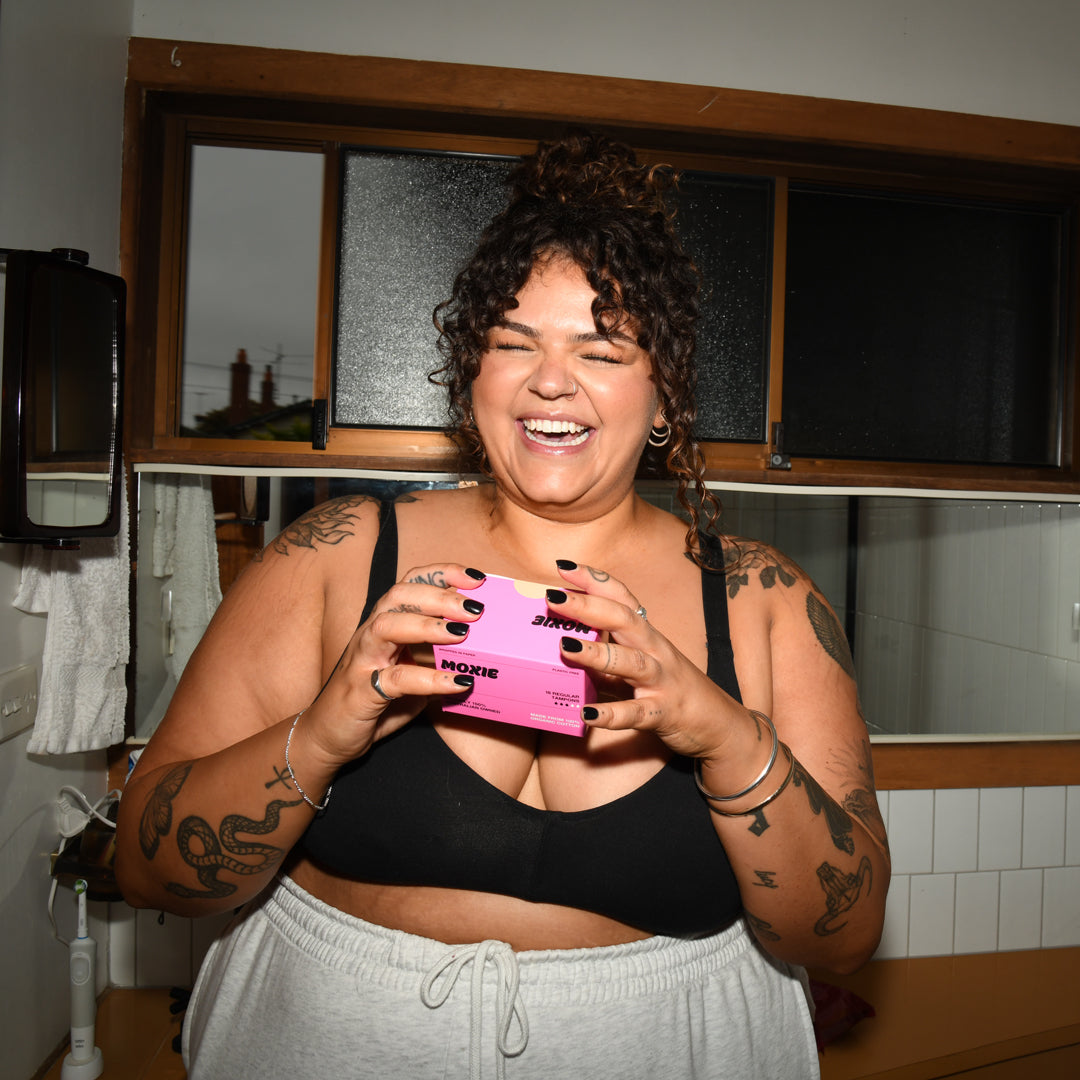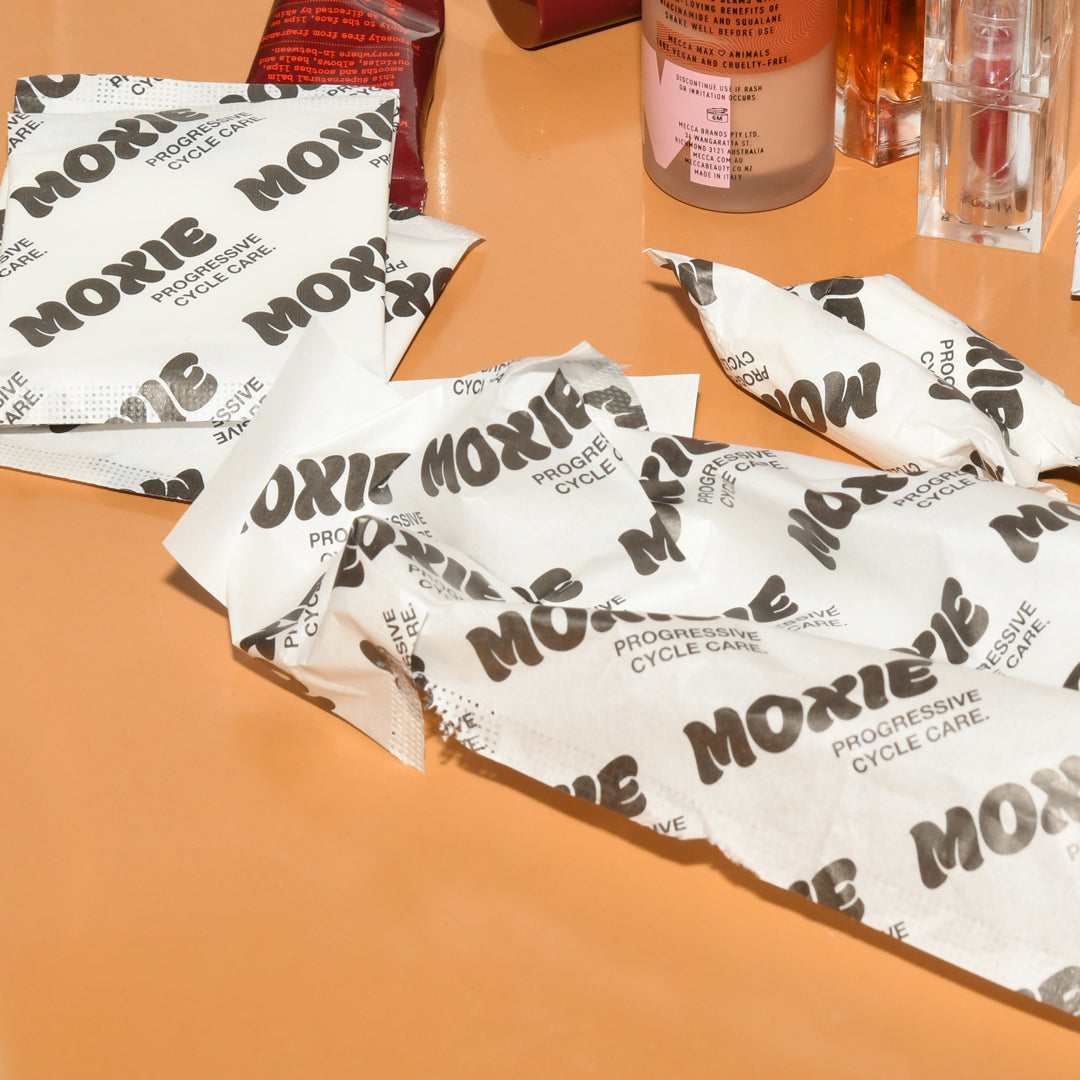What is PCOS and how do I know the signs?

Irregular periods (or not period at all), excess hair growth, weight gain, fertility issues, acne... If these symptoms sound familiar to you, you might be experiencing a condition known as Polycystic Ovarian Syndrome (a.k.a. PCOS) - an acronym that gets thrown around quite a bit and one you've probably heard before - but do you really know what it means, what to look out for and what your options are for treatment? Let's dig a little deeper and delve into the important things to know.
WHAT IS PCOS?
In simple terms, PCOS is a complex hormonal condition affecting people born with female reproductive organs, that causes enlarged ovaries with multiple cysts ('poly' is Greek for 'many') on one or both ovaries; amongst a heap of other symptoms, which we'll explain more about in a moment.
WHAT CAUSES PCOS?
The causes of PCOS aren't fully understood; but according to info provided by BetterHealth.vic.gov.au in consultation with Jean Hailes, hormones, genetics, your family history (as in, whether your mum, aunt or another close blood-relative were affected by the condition) and lifestyle can contribute to whether or not you'll be affected.
WHAT ARE THE SYMPTOMS OF PCOS?
Noticeable* symptoms of PCOS include:
- Irregular periods, heavy periods, or no periods at all
- Acne
- Excessive hair growth, a.k.a. hirsutism - particularly on your face, stomach, back and perhaps even your chest (PSA: hair around your nipples is totally normal, friends - PCOS or not!). Or, you may experience the opposite: thinning of the hair
- Weight gain
- Bloating
- Fertility issues (difficulty falling pregnant, which of course you may only notice if you're trying to do so!)
- Spotting or 'abnormal' vaginal bleeding in between periods (basically any kind of bleeding from the vagina when you're not in the bleeding phase of your cycle)
- Feelings of depression or anxiety.
Not everyone who has PCOS will experience every symptom - you might recognise some overlap in some of these symptoms with those of PMS (pre-menstrual syndrome), but the two are very different conditions that are also treated differently. We always recommend you see a trusted medical professional to help provide a proper diagnosis and treatment plan (more on how PCOS is diagnosed, a little further on).
(*in this context, let's consider 'noticeable' to be things that you would easily recognise as happening to your own body.)
HOW IS PCOS DIAGNOSED?
Unfortunately there's not a single, magic test that can diagnose PCOS. Doctors will consider a variety of factors to assist in their diagnosis; this may involve a pelvic exam or an ultrasound, blood tests to analyse your hormone levels, questions about your family history (whether or not anyone in your bloodline has had the condition) and of course, whether or not you're experiencing any of the above symptoms.
Note: If you are diagnosed with PCOS, ensure that your Doctor also regularly checks you for signs of Type 2 diabetes. According to the CDC (Centers for Disease Control & Prevention) more than half of women with PCOS will have Type 2 diabetes by age 40.**
AT WHAT AGE DOES PCOS START?
PCOS can happen at any age after puberty and will usually occur when you get your first period, but it can also develop later on in your 20s or 30s. That said, most people tend to discover they have it when they're trying to become pregnant and if they're experiencing difficulty with their fertility (and in turn, visiting their Doc in search of causes and treatment solutions).
CAN YOU GET PCOS LATER IN LIFE?
The not-so-great news is that you can devleop Polycystic Ovarian Syndrome at any age during your reproductive years, with some people with female reproductive organs developing it even during Perimenopause.
CAN I GET PREGNANT IF I HAVE PCOS?
Having PCOS may pose some challenges in getting pregnant, but the good news is that there are effective treatments available; these, coupled with certain lifestyle changes (as directed by your Doc), make pregnancy very possible for those with PCOS.
If you do have PCOS, you may be experiencing irregular or completely absent periods, making it either difficult to know when you are ovulating - or, you may not be ovulating at all - meaning that the follicles in your ovaries are not releasing eggs. No eggs = no possibility of pregnancy!
Your Doc will want to ensure that you're ovulating, amongst other things - so if a baby is on the wish list for you, see a trusted Doctor to help you through your fertility journey.
PCOS AND OVARIAN CYSTS - WHAT'S THE GO?
Having PCOS might also cause you to develop cysts (fluid-filled sacs) in your ovaries, which may cause pain (sometimes they can even rupture if not treated, though not all cysts will rupture. Or, they can but they may be very small and you won't even feel them. Read about Moxie Founder Mia's experience with a ruptured ovarian cyst in this piece).
But here's the thing: not everyone with PCOS will necessarily have ovarian cysts (which kinda makes the name of the condition a bit misleading, right?!), and those who don't have PCOS may even develop cysts!
Our bodies are weird (amazing, but weird), and it just goes to show how much we still have to learn about how they function...
If you do have ovarian cysts, you may experience moderate to severe pain, or no pain at all. In some instances, cysts can be surgically removed to prevent them from rupturing, Best to check in with your Doc.
TREATMENTS FOR PCOS
Unfortunately there is no cure for PCOS (yet!), but there are various ways to treat its symptoms. As mentioned earlier: not everyone with PCOS will have the same symptoms, and therefore each individual will require an individualised treatment plan, best directed by your Doctor. This usually consists of a combination of medications and lifestyle changes.
MEDICATIONS may include:
- The hormonal contraceptive pill - to help regulate the menstrual cycle
- Those that will help trigger ovulation (if you're trying to get pregnant)
- Those that can help reduce insulin levels and assist with weight loss, also helping to prevent you from getting Type 2 diabetes (which is common in people with PCOS)
- Those that can help control excess oil production in your skin and help to minimise acne flares.
LIFESTYLE CHANGES may include:
- Exercising regularly
- Eating a balanced diet and eliminating sugary, fatty foods that can contribute to weight gain
- Reducing stress and anxiety.
TREATING PMDD NATURALLY
We want to preface these suggestions by saying: please consider your own symptoms, lifestyle, body, and do what's right for you. Always check in with a medial professional if you're unsure about anything at all. There's no one-size-fits-all!
- UP YOUR IRON INTAKE. If heavy periods is one of your PCOS symptoms, you're likely losing a lot of blood during your period and may therefore be iron deficient, Ask your Doc to run some tests, but you can improve your iron levels naturally with foods like spinach and eggs.
- SWITCH COFFEE FOR HERBAL TEA. Here's one we prepared earlier (*shameless plug*)... our Moxie Australian Certified Organic PMS Blend tea contains Organic Ashwaghanda Root, which not only helps to promote hormone balance, but can also reduce stress and inflammation.
- ADD ZINC TO YOUR DIET. This trace mineral supplement is said to assist with unwanted excess hair growth and may help boost fertility. You can take it as a supplement (ask a Doc or Naturopath) or get your fix via wholegrains, chickpeas, red meat and tree nuts.
- EAT RIGHT, EAT WELL. We talked about it a little bit above, but if you do have PCOS, it's important to try and maintain a healthy weight so as to reduce your risk of developing Type 2 diabetes. A well-balanced diet will also help to regulate your period.
- SLEEP TIGHT. Get your eight hours in a night, at least.
- GET PHYSICAL. Moving your body releases endorphins, which are also known as natural pain-killers! Do whatever you feel you're up to.
- ACUPUNCTURE. This traditional Chinese practice is said to have many benefits - from increasing blood-flow around the body, to reducing cortisol levels (see-ya, stress!).
A little reminder to leave you with, Moxette: the info provided here is by no means intended to replace a personalised medical diagnosis from your healthcare provider or a medical professional. If in doubt, get checked out.
**Please note this is a US statistic last checked in 2020. We couldn't find a recent Australian stat at the time of publishing (we'll update the post when we do!).
Cover photo by Joe Gardner on Unsplash.



